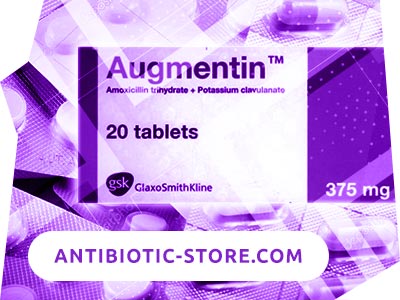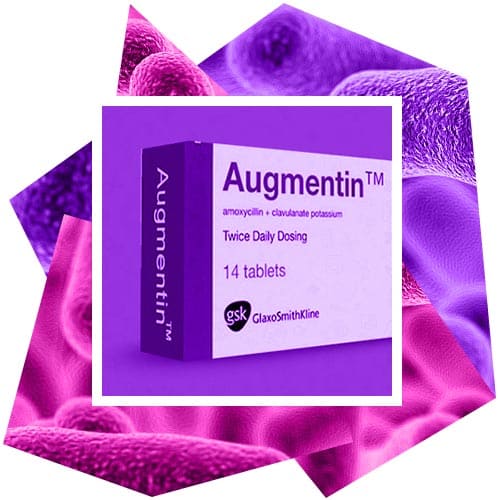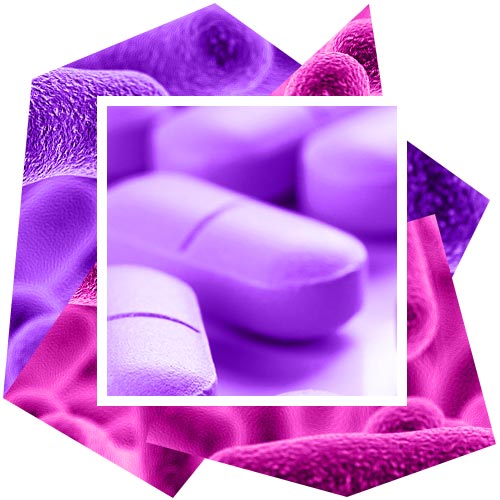Indications
Bacterial infections caused by drug-sensitive microorganisms:
- Infections of the upper respiratory tract and ENT organs (for example, recurrent tonsillitis, sinusitis, otitis media), usually caused by Streptococcus pneumoniae, Haemophilus influenzae, Moraxella catarrhalis, Streptococcus pyogenes;
- Lower respiratory tract infections: exacerbations of chronic bronchitis, lobar pneumonia and bronchopneumonia, usually caused by Streptococcus pneumoniae, Haemophilus influenzae and Moraxella catarrhalis;
- Urogenital tract infections: cystitis, urethritis, pyelonephritis, infections of the female genital organs, usually caused by species of the Enterobacteriaceae family (mainly Escherichia coli), Staphylococcus saprophyticus and species of the genus Enterococcus;
- Gonorrhea caused by Neisseria gonorrhoeae;
- Infections of the skin and soft tissues, usually caused by Staphylococcus aureus, Streptococcus pyogenes, and species of the genus Bacteroides;
- Infections of bones and joints: osteomyelitis, usually caused by Staphylococcus aureus, if necessary, long-term therapy;
- Odontogenic infections, for example, periodontitis, odontogenic, maxillary sinusitis, severe dental abscesses with spreading cellulitis;
- Other mixed infections (e.g., septic abortion, postpartum sepsis, intra-abdominal sepsis) as part of step therapy.
- Infections caused by microorganisms sensitive to amoxicillin can be treated with Augmentin, since amoxicillin is one of its active ingredients. Augmentin is also indicated for the treatment of mixed infections caused by microorganisms sensitive to amoxicillin, as well as microorganisms producing β-lactamase, sensitive to the combination of amoxicillin with clavulanic acid.
- The sensitivity of bacteria to the combination of amoxicillin with clavulanic acid varies depending on the region and over time. Where possible, local sensitivity data should be taken into account. If necessary, microbiological samples should be collected and analyzed for bacteriological sensitivity.
Augmentin is an antibacterial agent. Its main component is amoxicillin, a penicillin antibiotic that has a wide spectrum of activity against many microorganisms. Potassium clavulanate (clavulanic acid) has the ability to reduce the activity of beta-lactamase produced by microorganisms, making them vulnerable to an antibiotic. The presence of this acid in the drug protects amoxicillin from decay, expanding the spectrum of antibacterial action.
Microorganisms are sensitive to Augmentin: Gram-positive aerobes (Listeria monocytogenes, Streptococcus pneumoniae, Nocardia asteroides, Streptococcus pyogenes, Enterococcus faecalis, Bacillus anthracis, Streptococcus viridians, Streptococcus agalactiae, Staphylococcus aureus, Staphylococcus saprophyticus, coagulase-negative staphylococci), gram-negative aerobes (Haemophilus parainfluenzae, Moraxella catarrhalis, Haemophilus influenzae, Bordetella pertussis, Helicobacter pylori, Neisseria gonorrhoeae, Vibrio cholerae, Pasteurella multocida), Borrelia burgdorferi, Treponema pallidum, Leptospira ictterohaemorrhagiae, gram-positive anaerobes (Clostridium, Peptostreptococcus magnus, Peptococcus niger, Peptostreptococcus micros), gram-negative anaerobes (Bacteroides fragilis ), Capnocytophaga, Fusobacterium, Eikenella corrodens, Porphyromonas, Prevotella. Augmentin is also susceptible to microorganisms with acquired resistance: gram-positive (Corynebacterium, Enterococcus faecium) and gram-negative aerobes (Klebsiella oxytoca, Escherichia coli, Klebsiella pneumoniae, Proteus vulgaris, Proteus mirabilis, Salmonella, Shigella).
Insensitive microbes: Citrobacter freundii, Acinetobacter spp., Enterobacter spp., Legionella pneumophila, Hafnia alvei, Morganella morganii spp., Pseudomonas spp., Providencia spp., Serratia spp., Yesinia enterolitica, Stenotrophomas maltophilia, Chlamydia pneumoniadmiti psilamioptidae, Chlamydia pneumoniaoptidae, psi
Augmentin is indicated for the treatment of infections caused by microorganisms sensitive to it.
Augmentin tablets and suspension are prescribed for community-acquired pneumonia, acute bacterial sinusitis, otitis media, exacerbation of chronic bronchitis, pyelonephritis, cystitis, cellulite (cellulitis inflammation), skin infections, animal bites, dentoalveolar abscesses with cellulitis (acute inflammation), acute inflammation, structures bones (including osteomyelitis), joints.
The powder for the preparation of Augmentin solution is prescribed for the treatment of severe ENT infections (throat, nose, ear), namely mastoiditis (inflammation of the mastoid process), peritonsillar infection (suppuration of tissues around the migdalina), epiglottitis (inflammation of the epiglottis), severe sinusitis, community-acquired pneumonia ( pneumonia that occurs outside the hospital), cystitis (inflammation of the bladder), pyelonephritis (inflammation of the kidneys), skin infections, infections of soft tissues, animal bites, dentoalveolar abscesses, infections of bones, joints, inf projections of the genitals in women, intra-abdominal infections. It is also used to prevent bacterial infections during major operations.

Contraindications
Augmentin can not be used for allergies to any antibiotic-penicillin, the presence in the past of severe allergic reactions associated with the use of antibiotics, the presence in the past of violations of the liver or jaundice associated with the intake of amoxicillin, clavulanic acid.
Pregnancy and Lactation
Animal studies of different dosage forms of Augmentin did not reveal teratogenic effects (impaired embryo development). The use of Augmentin in a pregnant woman may increase the risk of developing necrotizing enterocolitis (inflammation and dying of the mucosa of the small and large intestines) in newborns. Therefore, its use during pregnancy should be avoided, especially in the first trimester.
Both components of Augmentin are excreted in breast milk. Accordingly, a baby may develop diarrhea (loose and frequent stools) and fungal infection of the mucous membranes.
Overdose
Symptoms of an overdose: digestive disorders, disturbances in water-electrolyte balance.
Treatment: correction of water-electrolyte disturbances. Crystalluria (crystallization of salts in the urine) may occur, which leads to renal failure.
Augmentin is well excreted by hemodialysis.
Side Effects
Infections: genital fungal infection, candidiasis (fungus) of the skin and mucous membranes, reproduction of organisms insensitive to amoxicillin.
Circulatory, lymphatic systems: leukopenia (a decrease in the number of white blood cells in the blood) and thrombocytopenia (a decrease in the number of platelets), hemolytic anemia (erythrocyte breakdown), an increase in bleeding time, prothrombin index (coagulation disorder).
Immune system: anaphylaxis (acute allergy), angioedema (swelling of the lips, tongue, face), allergic vasculitis, a condition similar to serum sickness.
Nervous system: reversible hyperactivity, convulsions, dizziness, headache, aseptic meningitis (inflammation of the meninges).
Vascular disorders: thrombophlebitis (inflammation of the vein with the formation of a thrombus) at the injection site.
Digestive system: diarrhea (frequent and loose stools), nausea, antibiotic-associated colitis (inflammation of the colon), including hemorrhagic and pseudomembranous colitis, hairy and black tongue, hepatitis, cholestatic jaundice (due to impaired bile outflow).
Skin: rash, itching, urticaria, erythema multiforme, bullous dermatitis, generalized pustulosis.
Urinary system: crystalluria, nephritis.
Special Instructions
Before starting treatment with Augmentin, it is necessary to collect a detailed medical history regarding previous hypersensitivity reactions to penicillins, cephalosporins or other substances that cause an allergic reaction in the patient.
Serious and sometimes fatal hypersensitivity reactions (anaphylactic reactions) to penicillins are described. The risk of such reactions is highest in patients with a history of hypersensitivity reactions to penicillins. In the event of an allergic reaction, it is necessary to discontinue treatment with Augmentin and begin appropriate alternative therapy.
In case of serious anaphylactic reactions, epinephrine should be immediately administered to the patient. Oxygen therapy, iv administration of GCS and provision of airway patency, including intubation, may also be required.
In the case of suspected infectious mononucleosis, Augmentin should not be used, since in patients with this disease, amoxicillin can cause a measles-like skin rash, which complicates the diagnosis of the disease.
Long-term treatment with Augmentin may lead to excessive reproduction of insensitive microorganisms.
In general, the drug Augmentin is well tolerated and has a low toxicity characteristic of all penicillins. During prolonged therapy with Augmentin, it is recommended to periodically evaluate the function of the kidneys, liver and hematopoiesis.
In order to reduce the risk of side effects from the gastrointestinal tract, the drug should be taken at the beginning of a meal.
In patients receiving a combination of amoxicillin with clavulanic acid together with indirect (oral) anticoagulants, in rare cases, an increase in PV (increase in MHO) was reported. With the joint appointment of indirect (oral) anticoagulants with a combination of amoxicillin with clavulanic acid, monitoring of the relevant indicators is necessary. To maintain the desired effect of oral anticoagulants, dosage adjustment may be required.
In patients with impaired renal function, the dose of Augmentin should be prescribed according to the degree of impairment.
In patients with reduced diuresis, crystalluria very rarely occurs, mainly with parenteral therapy. During the administration of high doses of amoxicillin, it is recommended to take a sufficient amount of liquid and maintain adequate diuresis to reduce the likelihood of the formation of amoxicillin crystals.
Ingestion of Augmentin leads to a high content of amoxicillin in the urine, which can lead to false-positive results in the determination of glucose in the urine (for example, Benedict test, Feling test). In this case, it is recommended to use the glucose oxidant method for determining the concentration of glucose in the urine.
Oral care helps prevent tooth discoloration associated with taking the drug, since it is enough to brush your teeth (for suspensions).
It is necessary to use the drug Augmentin within 30 days from the moment of opening the package of laminated aluminum foil (for tablets).
Abuse and drug dependence. No drug dependence, addiction, and euphoria reactions associated with the use of the drug Augmentin were observed.
Influence on the ability to drive vehicles and work with mechanisms. Since the drug may cause dizziness, it is necessary to warn patients about precautions when driving or working with moving machinery.
Incidence of adverse events
Infectious and parasitic diseases
Often: candidiasis of the skin and mucous membranes.
Disorders from the blood and lymphatic system
Rarely: reversible leukopenia (including neutropenia), reversible thrombocytopenia.
Very rarely: reversible agranulocytosis and reversible hemolytic anemia, prolonged bleeding time and prothrombin time; eosinophilia, thrombocytosis, anemia.
Immune System Disorders
Very rarely: angioedema, anaphylactic reactions, a syndrome similar to serum sickness, allergic vasculitis.
Disorders of the nervous system
Infrequently: dizziness, headache.
Very rare: cramps. Convulsions can occur in patients with impaired renal function, as well as in those who receive high doses of the drug Insomnia, agitation, anxiety, and behavior change.
Vascular disorders
Rarely: thrombophlebitis at the injection site.
Gastrointestinal Disorders
Often: diarrhea.
Infrequently: nausea, vomiting, dyspeptic disorders.
Very rarely: antibiotic-associated colitis (including pseudomembranous and hemorrhagic, is less common with parenteral administration of the drug Augmentin.
Violations of the liver and biliary tract
Infrequently: a moderate increase in the activity of aspartate aminotransferase and / or alanine aminotransferase (ACT and / or ALT). This phenomenon is observed in patients receiving therapy with any antibiotics of the penicillin series, but its effect on the clinical condition of the patient is unknown. Very rare: hepatitis and cholestatic jaundice. These phenomena are observed in patients receiving therapy with penicillin antibiotics and cephalosporins. Increased activity of alkaline phosphatase, hyperbilirubinemia. Adverse events from the liver were observed mainly in men and elderly patients and may be associated with long-term therapy.
The listed signs and symptoms usually occur during or immediately after the end of therapy, but in some cases they may not appear for several weeks after completion of therapy. Adverse events are usually reversible. Adverse events from the liver can be severe, in extremely rare cases there have been reports of fatal outcomes. In almost all cases, these were patients with serious concomitant pathology or patients receiving potentially hepatotoxic drugs.
Disorders of the skin and subcutaneous tissue
Infrequently: skin rash, itching, urticaria.
Rarely: erythema multiforme.
Very rarely: Stevens-Johnson syndrome, toxic epidermal necrolysis, bullous exfoliative dermatitis, acute generalized exanthematous pustulosis.
In case of skin allergic reactions, treatment with Augmentin should be discontinued.
Violations of the kidneys and urinary tract
Very rare: interstitial nephritis, crystalluria.

Interaction with other drugs
The simultaneous use of the drug Augmentin and probenecid is not recommended. Probenecid reduces the tubular secretion of amoxicillin, and therefore the simultaneous use of the drug Augmentin and probenecid can lead to an increase in blood concentration and concentration of amoxicillin, but not clavulanic acid.
The simultaneous use of allopurinol and amoxicillin may increase the risk of skin allergic reactions. Currently, there is no data in the literature on the simultaneous use of a combination of amoxicillin with clavulanic acid and allopurinol.
Penicillins can slow the elimination of methotrexate from the body by inhibiting its tubular secretion, so the simultaneous use of Augmentin and methotrexate may increase the toxicity of methotrexate. Like other antibacterial drugs, the drug Augmentin can affect the intestinal microflora, leading to a decrease in the absorption of estrogen from the gastrointestinal tract and a decrease in the effectiveness of combined oral contraceptives. The presence of clavulanic acid in the Augmentin preparation can lead to nonspecific binding of immunoglobulin G and albumin to the red blood cell membrane, which can lead to a false positive reaction with the Coombs test. The literature describes rare cases of increasing the international normalized ratio (MHO) in patients with the combined use of acenocoumarol or warfarin and amoxicillin. If simultaneous administration of the Augmentin® preparation with anticoagulants is necessary, the prothrombin time or MHO should be carefully monitored when prescribing or canceling the Augmentin preparation; dose adjustment of anticoagulants for oral administration may be required.
In patients receiving mycophenolate mofetil, at the beginning of the use of amoxicillin and clavulanic acid, a decrease in the concentration of the active metabolite, mycophenolic acid, was observed before taking the next dose of the drug by about 50%. Changes in concentration observed before the administration of the drug cannot accurately reflect the general changes in the concentration of mycophenolic acid.
 US
US AU
AU CA
CA DE
DE FR
FR IT
IT ES
ES







